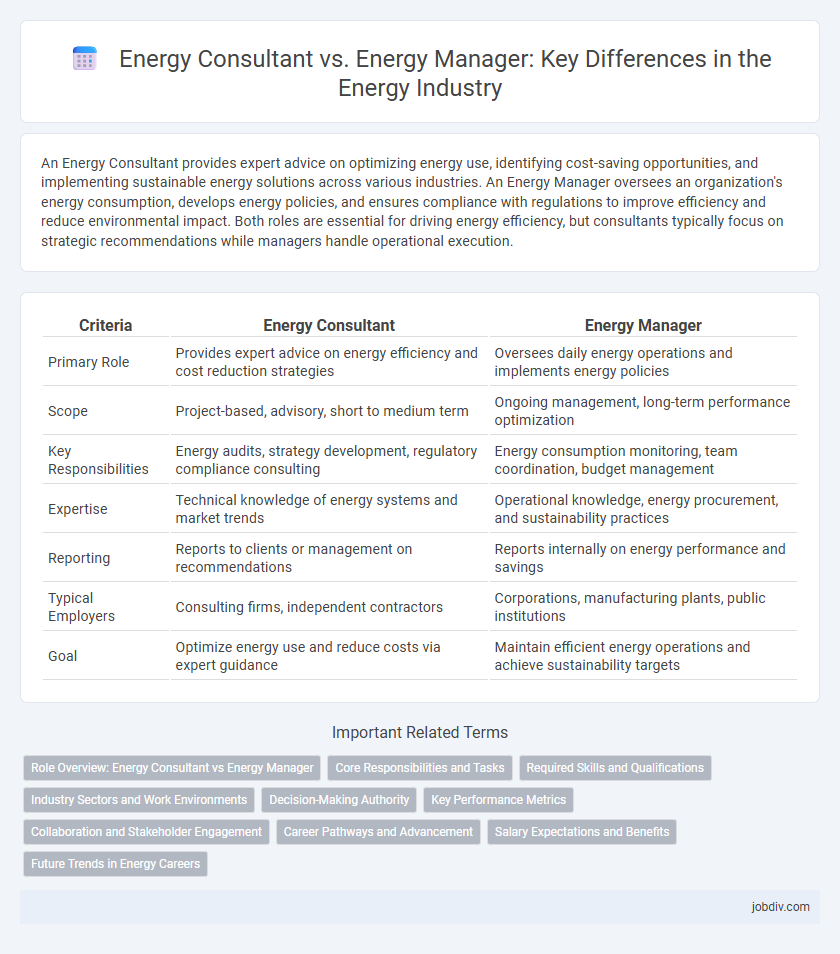An Energy Consultant provides expert advice on optimizing energy use, identifying cost-saving opportunities, and implementing sustainable energy solutions across various industries. An Energy Manager oversees an organization's energy consumption, develops energy policies, and ensures compliance with regulations to improve efficiency and reduce environmental impact. Both roles are essential for driving energy efficiency, but consultants typically focus on strategic recommendations while managers handle operational execution.
Table of Comparison
| Criteria | Energy Consultant | Energy Manager |
|---|---|---|
| Primary Role | Provides expert advice on energy efficiency and cost reduction strategies | Oversees daily energy operations and implements energy policies |
| Scope | Project-based, advisory, short to medium term | Ongoing management, long-term performance optimization |
| Key Responsibilities | Energy audits, strategy development, regulatory compliance consulting | Energy consumption monitoring, team coordination, budget management |
| Expertise | Technical knowledge of energy systems and market trends | Operational knowledge, energy procurement, and sustainability practices |
| Reporting | Reports to clients or management on recommendations | Reports internally on energy performance and savings |
| Typical Employers | Consulting firms, independent contractors | Corporations, manufacturing plants, public institutions |
| Goal | Optimize energy use and reduce costs via expert guidance | Maintain efficient energy operations and achieve sustainability targets |
Role Overview: Energy Consultant vs Energy Manager
Energy consultants analyze energy usage patterns and recommend strategies to reduce consumption and costs for clients. Energy managers oversee the implementation of energy policies within organizations, ensuring compliance with regulations and optimizing operational efficiency. While consultants provide expert advice and project-based solutions, energy managers maintain ongoing energy programs and performance monitoring.
Core Responsibilities and Tasks
Energy Consultants analyze energy consumption patterns and recommend efficient solutions to reduce costs and environmental impact. Energy Managers oversee the implementation of energy policies, coordinate energy-saving projects, and ensure compliance with regulations across an organization. Both roles prioritize sustainable energy use, but consultants focus on strategic advisory services while managers handle operational energy management.
Required Skills and Qualifications
Energy Consultants require expertise in energy auditing, regulatory compliance, and cost analysis, with qualifications typically including a degree in environmental science, engineering, or a related field along with certifications like Certified Energy Manager (CEM). Energy Managers focus on operational energy efficiency, project management, and sustainability strategy implementation, often holding advanced degrees in energy management or business administration and professional experience in facility management or corporate sustainability. Both roles demand strong analytical skills, knowledge of energy systems, and proficiency in data analysis tools, but Energy Managers emphasize leadership and decision-making capabilities within an organizational context.
Industry Sectors and Work Environments
Energy consultants primarily work across diverse industry sectors such as manufacturing, commercial real estate, and renewable energy projects, offering specialized advice on energy efficiency and sustainability strategies. Energy managers are typically embedded within large organizations or industrial facilities, overseeing daily energy consumption, implementing cost-saving measures, and ensuring compliance with energy regulations. While consultants often engage with multiple clients on project-based contracts, energy managers maintain ongoing operational roles within a single company or sector.
Decision-Making Authority
Energy Managers hold significant decision-making authority in implementing energy-saving strategies and operational changes within organizations, directly influencing budget allocations and project approvals. Energy Consultants provide expert analysis and recommendations but typically lack the authority to enforce decisions, serving primarily as advisors to guide management. The distinction in decision-making authority impacts the speed and scope of energy efficiency initiatives, with Energy Managers often acting as key drivers in organizational energy policies.
Key Performance Metrics
Energy Consultants focus on analyzing energy usage patterns and recommending efficiency improvements based on detailed audits, targeting metrics like energy cost savings and carbon footprint reduction. Energy Managers oversee implementation of these strategies, monitoring real-time consumption, operational efficiency, and compliance with sustainability goals. Key performance metrics for Energy Managers include energy intensity, return on investment (ROI) for energy projects, and achievement of organizational energy reduction targets.
Collaboration and Stakeholder Engagement
Energy consultants leverage deep technical expertise to develop tailored energy solutions, collaborating closely with stakeholders to align strategies with organizational goals. Energy managers focus on implementing these strategies by coordinating internal teams and driving operational efficiencies through continuous stakeholder engagement. Both roles require seamless communication and collaboration to optimize energy performance and sustainability outcomes.
Career Pathways and Advancement
Energy Consultants specialize in analyzing energy consumption patterns and recommending efficiency improvements for diverse clients, often working on a project basis with a focus on technical assessments and regulatory compliance. Energy Managers oversee organizational energy use, implementing strategies to optimize operations, reduce costs, and meet sustainability goals, typically holding leadership roles within companies or institutions. Career advancement for Energy Consultants may lead to senior advisory positions or consultancy firm partnerships, while Energy Managers often progress to director-level positions or executive roles in corporate sustainability and operational management.
Salary Expectations and Benefits
Energy Consultants typically earn between $65,000 and $100,000 annually, with compensation influenced by project diversity and client base, while Energy Managers often command higher salaries ranging from $80,000 to $120,000, reflecting their broader responsibilities in overseeing energy strategies within organizations. Benefits for both roles frequently include health insurance, performance bonuses, and opportunities for professional development, but Energy Managers may receive additional perks such as stock options and executive-level retirement plans due to their senior positions. Salary growth in energy consultancy is closely tied to market demand for sustainability expertise, whereas energy management roles benefit from organizational expansion and increased corporate focus on energy efficiency.
Future Trends in Energy Careers
Energy consultants specialize in assessing and advising on energy efficiency, renewable integration, and sustainability strategies, shaping future energy solutions in dynamic markets. Energy managers focus on implementing and optimizing energy systems within organizations, leveraging smart technologies and data analytics to reduce costs and carbon footprints. Emerging trends emphasize digital transformation, decarbonization efforts, and regulatory compliance, creating overlapping yet distinct career paths for consultants and managers in the evolving energy sector.
Energy Consultant vs Energy Manager Infographic

 jobdiv.com
jobdiv.com